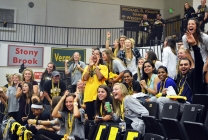
There are countless acronyms and nicknames that are spoken around campus. You’re nearly guaranteed to hear at least one every day. It’s quick and easy to converse with the campus lingo, and it is a language that nearly everyone has come to comprehend.
As a student-athlete on campus, there is one acronym that I hear nearly every day: NARP. The acronym stands for Non-Athletic Regular Person. The term is used quite freely among athletes—and typically in a derogatory manner.
“That’s so something a NARP would do…” or “Who cares, he’s just a NARP.” Or, in most cases, something as explicit as: “I really can’t stand NARPs.”
When I hear the short-hand for fellow students, it frustrates me to hear the disparaging term. The acronym is a gross generalization of the remainder of the student body. Simply because a person does not participate in a varsity sport does not mean that they are unathletic. There is a myriad of students on campus who excelled in their respective sports, but simply chose not to compete at the college level.
Freshman Matthew Naumann, now labeled as a “NARP,” was a standout swimmer at Dulaney High School in Maryland. Even with a successful high school career, Naumann had no interest in competing at the college level.
“I wanted to focus on my studies in college,” he said. “I figured that I wouldn’t have enough time to meet the demanding practice schedules.”
When asked if he is offended by the term “NARP,” Naumann responded candidly.
“I would be hurt if someone called me a NARP directly to my face,” he said. “It makes me mad that just because I’m not a Division I athlete that automatically means I’m not athletic. Yes, Division I athletes are talented in their respective sports, but I would argue that being athletic also includes casually playing multiple sports well, too.”
Many of these so-called “non-athletes” spend a great deal of their time playing club sports, or working out in the RAC. The weight room is almost always at full capacity, and it is rare to spot an unused treadmill or elliptical. The courts at the RAC are consistently home to a pickup basketball game, or a round of badminton. Not to mention, those participating often have impressive skills in their chosen sport.
It is widely assumed throughout the athletic community that non-athletes have little to no idea about the crazy schedules we athletes must maintain. In many ways, I too agree with this sentiment, but I am well aware that many non-athletes are pressed for time as well. College is time-consuming for any type of student, regardless of what activities you choose to do. There are ample opportunities for non-athletes to fill their time with clubs, organizations, or even part-time jobs. Time management is essential for every single person on campus, not just the athletes.
I am also well aware of the stereotype that the varsity athletes have accrued. Seemingly, since the beginning of athletics, athletes have been labeled as “dumb jocks.” Whether it be in high school or in college, athletes can never seem to make the grade.
I see this stereotype play out nearly every day. I’m wary of the professors who look at me different when I’m in my UMBC athletics clothes and how their personalities towards me change once I’m in street clothes.
Even though athletes joke about being “athlete-students” instead of “student-athletes,” we know that academics come first. We are aware of the harsh reality that our athletic careers will most likely end once we graduate, so we need to build ourselves a future that doesn’t include sports. We need to graduate with a legitimate degree just like everyone else.
Along with the assumed lack of intelligence comes the common misconception that athletes are accepted into universities without the necessary standardized test scores and or meeting necessary admission requirements. Larger universities with sports teams that turn a profit are often the schools that give everyone else a bad name.
To be accepted to play softball at UMBC I had to get the necessary SAT and ACT scores. My National Letter of Intent would’ve been nulled and voided if I wasn’t first accepted into the university. UMBC is known for its high academic standard, and everyone on this campus worked hard for their acceptance letter.
Be you a “NARP” or a “dumb jock,” remember that you are more than just a gross generalization of a group. Everyone has specific talents that break stereotypes. Students at UMBC are more than just oversimplified images or ideas—so think twice before you rush to categorize someone.
The post Busting stereotypes : “NARPs” and “dumb jocks” appeared first on The Retriever.





